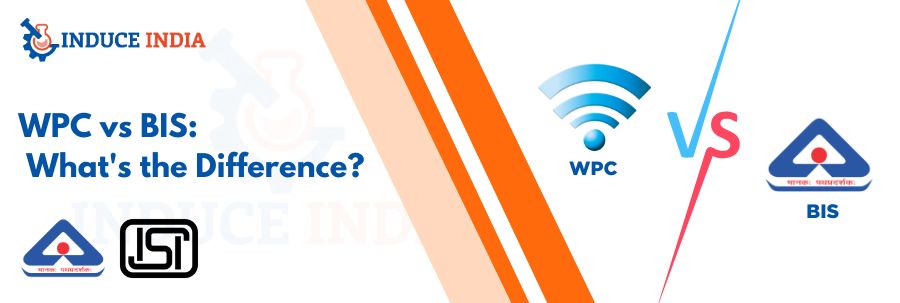When it comes to product launches in India, especially electrical, wireless, or industrial equipment, one cannot do without legal compliance. Two certificates have lately taken centre-stage: WPC and BIS. Each one is mandatory for a different kind of product. But, either the two are mixed up by people, or they neglect the specific role that each must play.
What, then, is the difference between WPC and BIS? In simple language, so you can easily find out what your product needs and why.
Understanding The Basics: What is BIS?
BIS means the Bureau of Indian Standards. It is the Indian national standards body and functions under the Ministry of Consumer Affairs to provide standards for the quality of products, safety, and performance.
If you are manufacturing, importing, or selling products such as electronics, toys, kitchenware, or cement, the BIS certification in India requires that the product have been tested in India and conform to published standards of safety and performance in India.
BIS certification can be of two types:
- Mandatory certification: For products that fall under the Compulsory Registration Scheme (CRS).
- Voluntary certification: For brands that wish to attest to their quality commitments when their product is not under CRS.
To put it simply, the BIS ensures that the product is fit for use in India.
What is WPC and What Does It Cover?
WPC stands for Wireless Planning & Coordination Wing, under the Ministry of Communications, India. Its main functions concern the enforcement of laws on wireless devices and frequency bands. So your product needs to have a WPC Certification if it uses any sort of wireless technology: Bluetooth, Wifi, RF, etc., which must ensure that the device is not hindering any other communication channel.
The major products needing certification are:
- Mobile phones
- Wireless headphones
- Routers
- Smartwatches
- IoT Devices
- RFID Equipment
Simply put, WPC ensures that the wireless-enabled product uses frequency and power levels legally allowed in India.
Key Differences Between WPC and BIS
Even though both attestations are mandatory for certain products, their scope and certifying procedures are entirely different. Let us understand in detail.
BIS is quality and safety-oriented. Contrastingly, WPC deals with frequency compliances. This means despite an excellent design and being safe (as per BIS), a wireless product has to be approved by WPC in terms of the spectrum used. For example, smart TVs get BIS-certified for safety and quality requirements. If they are fitted with any Bluetooth or Wi-Fi modules, then of course, these modules need to undergo WPC approval. Therefore, with the arrival of new-age technologies, many modern gadgets require BIS and WPC certifications prior to their legal sale or use in India.
Another main difference is that the testing under BIS has to be done within India, at a BIS-recognised lab only, while WPC mostly requires just documentation such as RF test reports from foreign labs, as well in some cases. as long as they adhere to accepted test standards.
Which products require BIS certification?
Let’s understand this with some greater clarity. Among the products needing BIS certification are:
- Mobile phones and tablets
- LED lights and bulbs
- Laptop and computer peripherals
- Power banks
- Air conditioners and refrigerators
- Washing machines
- Microwave ovens
- Pressure cookers and helmets
- Electric irons, electric kettles, and many more
So, be it the manufacture or the literal import of the articles, BIS certification is to be obtained before the sale of any articles listed under the CRS, to the Indian market.
Which Products Require WPC Approval?
WPC must grant certification to all the products which involve the transmission or reception of radio signals. This includes:
- Wireless Speakers
- Bluetooth Devices
- Wi-Fi Routers
- Smart watches
- GPS Trackers
- Cordless Phones
- RFID Readers
- Wireless Medical Devices
- Devices with RF Modules
The provision says that the approval must be secured for any device with wireless capability right from the wireless module itself, with Bluetooth or Wi-Fi.
Is One Certification Enough?
Very few products today are just electronic or have just wireless elements. For example, a smartphone requires BIS certification for the battery, the adapter, and the phone, but it also must get WPC approval for Bluetooth, Wi-Fi, and cellular frequency bands.
In other words, depending on the functions and components, multiple certifications could be required for one product. It is advisable to really go to consult professionals who focus on certification processes, such as Induce India; they know what certification your product requires and will deal with all the paperwork and approvals in a hassle-free manner.
Mention spinning from uncertified goods can result in heavy penalties in India-product seizure, heavy import restrictions, etc. But it spells disaster for the company’s reputation and consumer trust.
Non-compliance can imply:
- Customs is not allowing uncertified products to be imported
- Indian retailers are not listing or selling your product
- Legal actions or fines imposed by regulatory agencies
- Product recalls and losses
So it is always preferable to invest time and effort in getting the appropriate certification before sales.
In Documentation and Process: A Comparative Analysis
The general process for BIS Certification includes:
- Testing of product samples in an Indian laboratory approved by BIS
- The submission of documentation such as test reports, factory licenses, and the KYC of the company
- Factory inspection (for certain types)
- Procuring the final BIS registration
While for WPC, the process involves:
- RF Test reports of the wireless module (usually from NABL-approved or international labs)
- Product datasheet and technical documents
- Authorisation letters and undertakings
- ETA submission to the WPC
As a result, on a time and complexity basis, BIS certification usually takes longer in the presence of a complete certification setup in India, while WPC may remain faster, provided one has their paperwork in order.
Conclusion
Whether you are a startup, an importer, or an established manufacturer, knowing the difference between BIS and WPC is a must for your success in the Indian market. They both have their importance, and missing any one could severely delay entry to the market or even lead to litigation.
BIS protects the consumers by ensuring product quality, whereas WPC protects the national communication infrastructure by regulating wireless frequencies. They thus jointly ensure a properly functioning market for the industry and the consumers.
Instead of getting lost in paper jams and government approvals, you can engage the services of certification experts like Induce India, who take complete responsibility for the certification process-from figuring out which certifications to file and then filing documents and getting approvals.



